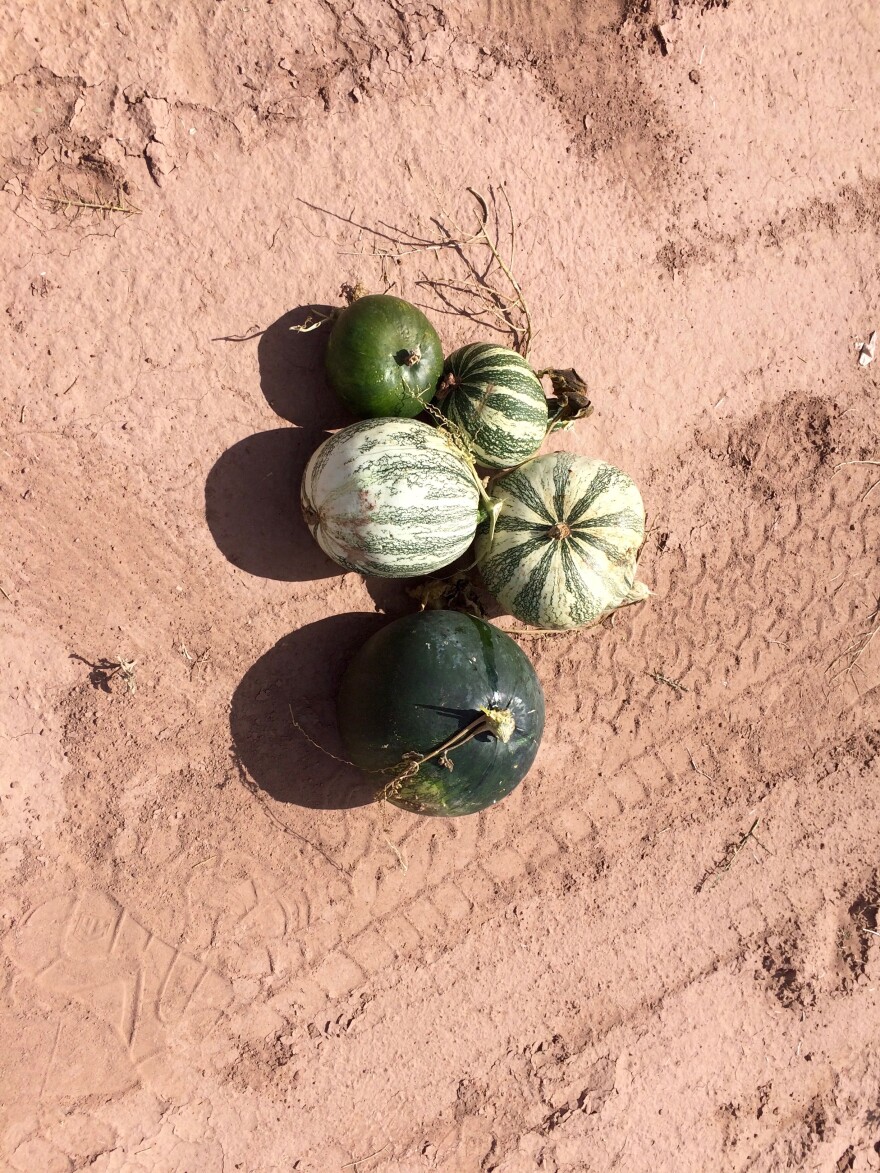When the oil and gas industry takes a dive, or when extractive industries tank, so do economies in rural areas, where a lot of the jobs come from drilling, or mining, or power plants. A business incubator is helping entrepreneurs on the Navajo Nation with the idea that local skills and talents—and cash flowing in and out of local businesses—are key to independence from environmentally damaging corporations.
There are about a thousand or so residents in Leupp on the Navajo Nation in Northern Arizona. They drive about an hour to get to a supermarket with fresh fruits and vegetables. Farmer Stacey Jensen is trying to change that by growing and trading food. "Like for example, I’ll get apricots and peaches from Monavie, Tuba City area, get some beans from Hopi, from the mesas, then down here, Apache, I know they have some really good corn," he said. "Then we just bring them up and try to create a food hub."

Jensen is envisioning a market on the North Leupp Family Farm. The co-op of local families here grows white, blue and yellow corn, a variety of melons and squash, chile, potatoes, onions, garlic—all with environmentally sensitive practices. "We don’t try and rely on chemical pesticides or herbicides or anything like that," he said. "Even with our fertilizer. We go to grandma, invade her sheep corral, then we bring all that manure back.
Grandma is Betty Kelly. She is in her 90s, and she works on the farm all season long. She drove up in a big white truck and then sat on a folding chair in the greenhouse for an interview.
She loves to see young people working with the food as it grows here on the farm. She compares raising kids to raising corn, and said they’re both dear to her and give a lot of meaning to her life. You treat seeds like you treat kids, she said, with respect and care.
When she was growing up, she said, gardening was how people ate. It’s part of regional independence and self-reliance. To this day, in her fridge and freezer, she has stacks of produce that she grew here on the farm. That’s how she eats all year long.
But the tradition, Kelly said, isn’t always being passed on.

Jessica Stago is with the Native American Business Incubator Network, or NABIN. "If you go back, 30, 40 years ago, this wave of jobs came for our people and revenue into our tribes, which was good."
She said those jobs came from companies with no real stake in the community. "But now we’re facing the same economic decline, and we’re facing the same depressive economies that we faced 30, 40 years ago."
The official unemployment rate on the Navajo Nation is at least three times higher than New Mexico’s. And New Mexico’s rate is almost the highest among the 50 states.
NABIN says part of the solution here is supporting local entrepreneurs, people like farmer Stacey Jensen, so jobs can spring up, and money can stay on the reservation. The goal is to start 25 businesses every year. Right now, they’re working with about 12.
Stago said economies that rely on certain industries are often based solely on cash and money, but they don’t have to be that way. "Every economy both on and off the reservation can look at how do we go back to just the basics, having food—healthy food—available for the people that live here, and a way for them to sustain their family," she said.

There’s a barter economy at work, too, so getting a solid count of businesses is a challenge. Elaine Young is the manager for the Small Business Development Department in Window Rock. "We don’t capture a lot of the business here on the Navajo Nation, the activities that are going on," she said. "A lot of our Navajo people still do traditional basketweaving, rug weaving, silversmithing … "
Those skills are learned at an early age, Young said, and it’s hard for folks to understand why they should establish an official business — plus the U.S. government put a ton of regulatory hurdles on the reservation, so a lot of Navajo entrepreneurs start their businesses in the border towns instead.
Young said encouraging small business here could be a big boost to the economy. "What would change that we’re hoping to see is the unemployment, you will see a difference there, as well as the nation benefiting as a whole, bringing in the sales dollar—just pretty much employing more of our own people."
Young wants to see the talents and education of tribal members put to use on the Navajo Nation, she said, to create local companies and corporations rather than relying on outside resources.
*****
This report is part of the State of Change project by news organizations around New Mexico. It’s part of the Solutions Journalism Network. KUNM co-reported this story with New Mexico PBS. Look for it on KNME-TV channel 5 Friday, Oct. 27, at 7 p.m. and again Sunday, Oct. 29, at 7 a.m.




